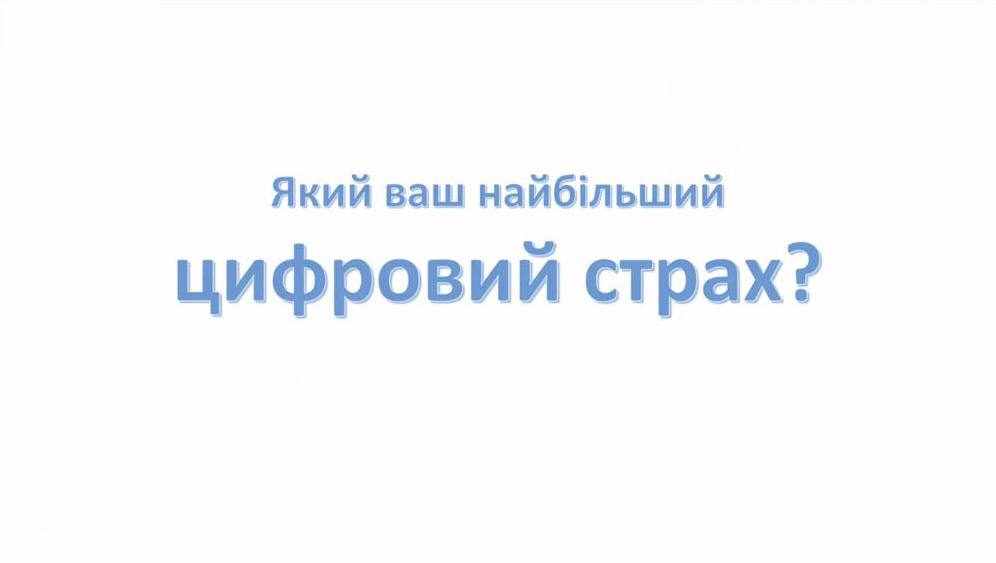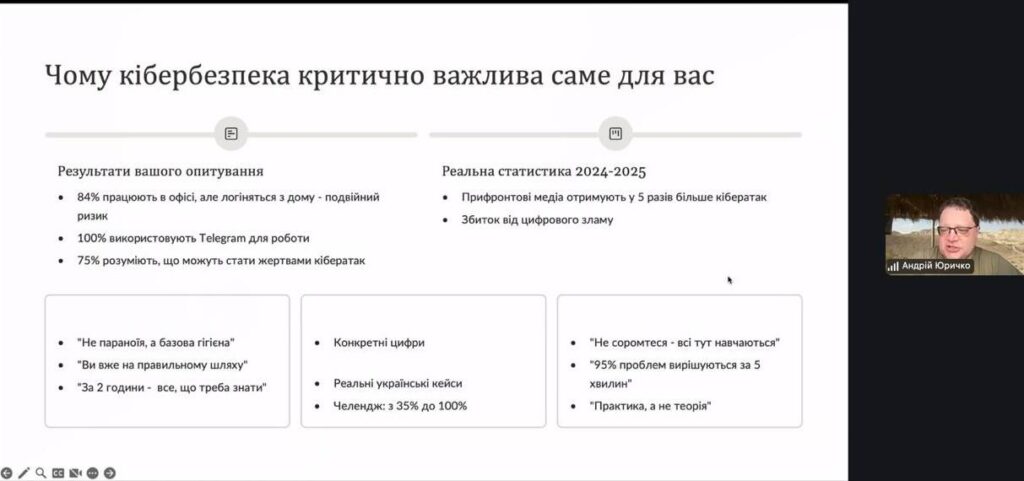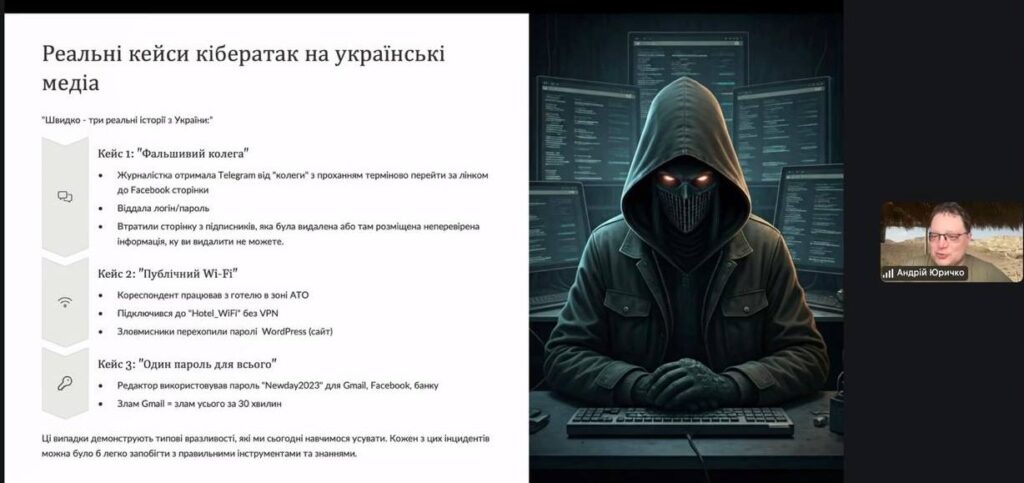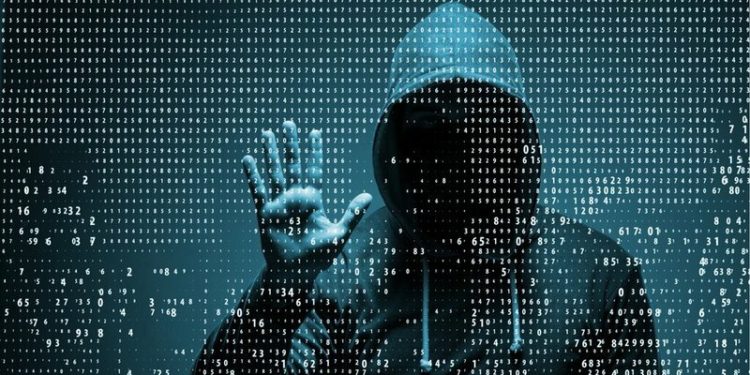Viruses, account hacking, loss of archives and passwords – “digital fears” voiced by participants of the training course called Strengthening the Resilience of Front-line Media as a Tool for Combating Disinformation during a mentoring session on digitalization. The first session for representatives of five front-line media (a total of 20 newsrooms are participating in the project) was conducted by Andrii Yurychko, a mentor on digital transformation, journalist, and media coach of the Academy of Ukrainian Press.
During the online training, participants discussed popular instant messengers, email services, organizing digital archives, and ways to store passwords. And not just discussed, but directly at the meeting, they downloaded the necessary applications, configured them for work, and checked their usability.

Messengers and mail
“If you choose between Telegram, WhatsApp, and Signal, the first is considered the least secure, and the last is the most secure. But Signal is not popular among the population in Ukraine,” said Andrii Yurychko.
“There are investigative articles that claim that one of the founders of Telegram has contacts with the russian federation and even receives state orders. Therefore, communication and data in this messenger may not be so protected from russian special services,” explains the expert.
Practical advice on using messengers:
- Telegram – use it to maintain public channels, as it remains the most popular in Ukraine for obtaining information;
- Signal – the best choice for confidential communication and sending important documents;
- WhatsApp – suitable for everyday use by journalists- is currently going through some of Telegram’s popular functions for maintaining public channels, and perhaps will completely replace it.
During the meeting, its participants went through all the security settings in messengers step by step, explaining what is responsible for what, where which check mark should be, where to look for additional connected devices, and how to remove unnecessary access on old gadgets or in cases of hacking.
Email: Why is Gmail the choice for now?
When choosing between Internet services for email, Andrii Yurychko advises Gmail. Today, the service provides the most free additional resources, including Google Drive cloud storage, search engines configured for local geolocation, and applications with artificial intelligence elements such as NotebookLM and AI Studia.
Additional advice: create several Gmail accounts – one main for work, and a backup account that is not related to you personally.
At the same time, you should not completely rely on cloud services as the only source of information storage.
A Google profile can also be hacked, and then you can lose not only current documents, but also access to archives.
But through a Google profile, you can log in to other resources without worrying about coming up with a new, unique password. Participants tested the password manager in practice.
Practical tips for using browsers:
- LibreWolf is a browser that focuses on user privacy and security. It has improved privacy settings, turns off telemetry and data collection. An alternative for those who want more anonymity on the Internet.
- Brave is a Chrome-based browser for those who do not want to give up Google services but want to limit the collection of data about their activity.
- Bitwarden is a free password manager that allows you to store and manage passwords. But it is better not to register through your main email. This tool generates complex, unique passwords for each site and stores them in encrypted form.
- ProtonMail is a Swiss email service that is much more secure than Gmail, with open source.
Preservation of editorial archives
One way to preserve editorial archives is to digitize materials. This is relevant both due to shelling and due to the relocation of newsrooms. In addition, digitizing and posting digital archives online significantly increases traffic on the Internet, since written articles are a unique product that search algorithms scan and index.
At the same time, according to Andrii Yurychko, it is always worth having a backup option – local storage.
“Cloud services are great, but I would recommend having backup options. In particular, hard drives and flash drives are not so expensive now. You can also create a separate Gmail account that is not associated with your account. Store another copy of all documents here. This is a backup option if something happens,” the expert advises.
Life hack with an “attic” laptop
To prevent data loss in case your account is hacked, the expert advises setting up Google Drive on some old “spare” laptop.
Algorithm of actions:
- Save data there
- Disconnect it from the Internet
- Store somewhere conditionally, “in the attic”
In case you are hacked or you lose your equipment, you can simply take another laptop and restore everything. If you need to update your data, connect to the Internet, update, and then disconnect again.



Account hacking: how to prevent it
Almost everyone knows about most of the schemes for hacking accounts on social networks, messengers, etc.: messages with a call to “vote for your nephew/niece,” dubious letters from a “bank,” etc. Phishing is now perhaps the most popular type of Internet fraud, through which data is extracted, including phone numbers, contacts, correspondence, and addresses, which can then be used.
The main threats and how to avoid them:
- Public Wi-Fi is another “hook” that you can fall for. It is usually the easiest to hack when you can slip a copy of the real page, enter the same data on the real one, but then completely intercept access. So, if you have the opportunity to use mobile Internet, it is better to use it. In this case, it will be much more difficult to “hack” you.
- Physical removal of the device – for example, theft. The easiest way to counteract this is to use passwords to access the gadget. Graphic password – the same movements leave traces on the screen. A password of 6 characters is already better, and with an unknown number of characters and letters is almost ideal. Unlocking via FaceID and fingerprint carries its risks that need to be assessed.
Additional security tips:
- Regularly change passwords;
- Do not use the same passwords for different services;
- Enable two-factor authentication wherever possible;
- Regularly check for unauthorized access to your accounts;
- What is worth installing: a set of security tools.
Google Authenticator (also for IOS) or 2FAS – an application that provides another level of two-factor authentication for account protection. It generates one-time codes that are used together with the password to log in to services. Even if someone finds out your password, they will not be able to log in without the code sent to your phone.
Tails operating system – runs on a flash drive. It is designed not to leave traces on the computer after use. You can download it from the tails.net resource. An ideal tool for working with confidential materials.
Antivirus – among the free options, you can choose Avast, but any other, except russian, will do. However, even the properly configured built-in Windows Defender can cope with 90 percent of threats.
Stop.ru plugin – a browser extension from Ukrainian developers for the de-russification of YouTube. Helps filter russian content from recommendations.
“For me, one of the biggest fears was the loss of passwords to accounts and editorial archives. In addition, we have power outages in the Sumy Region, and editorial computers are already old. Therefore, advice on services that can generate and store passwords, as well as on backups, has become very relevant,” shares in a comment to the NUJU, editor-in-chief of the Putylivski Vedomosti newspaper, Tetiana Kaushan. “We journalists often do not pay much attention to digital security issues, because we do our work in conditions of limited resources – both financial and human. Thanks to this training, we have already decided which methods we will choose for ourselves.”
Oleksandr Solomko, the head of a media network in the north of the Sumy Region, also learned a lot of useful things for work: “They have tried to hack us more than once, but now we are stronger.”
Digital security for a journalist is not paranoia, but a necessity, especially in conditions of war, emphasizes Andrii Yurychko. Simple steps for digitalization and additional elements of digital protection can save years of work and protect sources of information. The main rule is always to have a Plan B, and better yet, a Plan C and D.
As homework for the next session, the participants received a checklist of recommendations for setting up security in messengers, mail, and cloud services.
The project is funded by the Embassy of the Republic of Lithuania in Ukraine within the framework of the Development Cooperation and Democracy Promotion Programme.


 THE NATIONAL UNION OF
JOURNALISTS OF UKRAINE
THE NATIONAL UNION OF
JOURNALISTS OF UKRAINE
















Discussion about this post